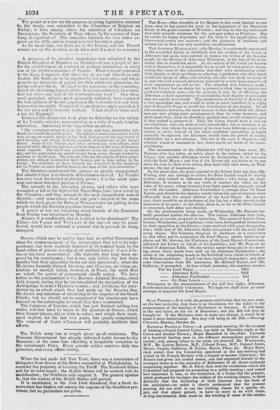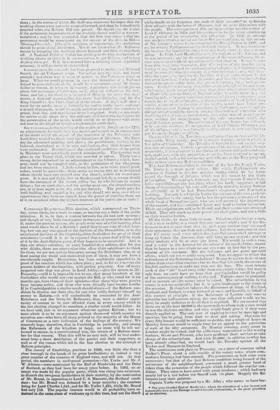GLAD TDDINGS.—It is with the greatest satisfaction that we now
state, on the best authority, that there is no foundation for the belief in the postponement of the meeting of Parliament to January. It will meet, at the very latest, on the 1st of December; and the Bill will then be brought in. If the Ministers were to make any change, it would be to make it more democratical. But they will bring in the Bill.—Morning Chronicle, Monday, October 24.
NATIONAL POLITICAL UNION.—A provisional meeting, for the purpose of forming a Grand Central Union, was held on Thursday night at the Crown and Anchor Tavern ; Major Beauclerk in the chair. Upwards of a hundred leading men in the different metropolitan parishes at- tended ; and, among others in the room, we observed Mr. Warburton, M.P., Mr. Lytton Bulwer, M.P., Colonel Evans, M.P., Colonel Jones, Messrs. Carpue, Galloway, R. Taylor, Bower, Place, &c. Major Beau- clerk stated, that the Committee appointed at the last meeting had waited on Sir Francis Burdett with a request to become Chairman ; Sir Francis had given his cordial assent, and had expressed himself in the strongest terms as to the necessity of Reformers of all classes zealously cooperating together. Mr. E. Perry then read the resolutions which the Committee had prepared for presenting to a public meeting ; and stated how important it was, at the institution of a Union like the present, which professed for its object the welfare of the working classes, to show distinctly that the furthering of their interests was the basis of the association—to make it clearly understood that the present meeting did not wish to use the working classes for a specific ob. ject, and that object gained, to have no more to do with them. A long conversation then arose on the wording of some of the resolu, Lions ; in the course of which Mr. Galloway expressed his hopes that the working classes were not to be tempted forward, and then be immediately deserted when the Rel'orm Bill was passed. He should join the Union if the permanent improvement of the working classes' contlitien was con- templated ; and he was persuaded that the first step tow:la's that im- provement would be consequent on the success of the Reiiiim
13i11.-
MorningChrt.niele. [On such occasions of importance, the lesolutions should be printed and distributed. We de not know what M r. Galloway means by tempting the working classes forward and thou tee ting them off. A National Pali/it:2d Union has nothing to do with distinctions of working classes or idle ; it is an, associatihn to get lie.bitm, t nd to keep Reform ittlpvi pot. If it be converted into a debating school 1 f political economy, it will go down in six months.] CONSERVATIVE GUARD.—It has been proposed to revive, its a 'National Guard, the old Volunteer ctirps. We rather fear the basis not broad enough; and there was a went of system in the Volunteer corps at large, What we would propose, in case the formation of a National Guard be gone seriously :shout, would be to constitute every 101. house- holder or tenant, in town or in 'eeuntry, a number: this would give us about 500 regiments of leen) men teth, after all deductions for sick, lame, and lazy : let there ite a 11;etieral of prigtele for every five regi- ments, a General cmume11(1IIVg for every four Brigades, told let the King himself be the Flelli-Marshal of the whole. A day's drill once it week for six weeks, once a fortnight for twelve weeks more, and once a month afterwards, would be amply sun:dent to enable the members to prime, load, fire, and march—no mere is required. Such it corps, ready for service at all times tliet the ordinary civil force was held:Ai/late for the preservation of the peace, would enable its to dispense with every red coat in the kit leslein ea teen a regiment for court show.
Sourewanen—Atthe meetiing of the perish of St. John's on the 17th, an adjournment for eight days was moved and agreed to, in consequence of the doubt which the report of the interview of the Delegates with Lord Grey tended to throes over the intentions of 7.dinisters. Ott Tues- day the adjourned meeting took place ; tile parishioners havinfr, in the interval, ascertained to their own satisfaction, that their former fears were unfounded. Resolutions of the continued confidence of the parish in Ministers were accordingly passed unanimously. The meeting took place in the Vestry Hall, which Was crowded to excess. There was it strong desire expressed for an adjournment to the Church ; which, how- ever, could not be complied with, as the permission of the clergyman had not been obtained. A little reform in this, as in other parish parti- culars, would be agreeable : there seems no reason why an ecclesiastical officer should have any control over the church, unless for sacred pur- poses. It is just and right, that on Sundays and holydays, no one should have the command of the sacred edifice but he who labours in sacred things ; but on week days, and for secular purposes, the churchwardens are, or at least ought to be, the sole key-keepers. The parish pays for both building and repairing it ; and why should one man, over whose appointment they have no control, have the power of shutting them out of it on occasions when the highest interests of the parish are at stake ?































 Previous page
Previous page